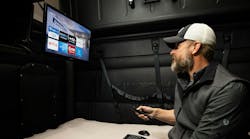Ask leasing customers why they choose to lease rather than own their truck equipment and one of the reasons they'll give is “convenience.” A leasing company offers them a place not just to rent a truck but also to buy a whole range of services.
Ryder System, Inc. offers fleets the convenience of true one-stop shopping. Customers can get their trucks spec'd to their requirements and needs, can arrange for financing through the company, can buy maintenance programs and insurance as needed, and can purchase fuel at certain locations. They can even have Ryder handle their fuel tax payments and other legal and regulatory requirements.
Dick Carson, senior vp-fleet management solutions for Ryder, says: “We also have a group of safety managers who provide services such as driver education and DOT compliance training, including training on equipment where certification is required, such as forklift operation. Our customers usually buy a full range of services with their leasing agreement.”
Ryder System based in Miami, FL, is celebrating its 70th anniversary this year. The multi-national company has 850-plus locations, serving 14,000 customers on four continents. Services range from simple one-day rentals to managing complicated supply chain and logistics arrangements for companies all over the world. Ryder also rents trailers, which account for about 15% of the company's total vehicles.
Leased equipment is supplied to customers through Ryder's Fleet Management Group. According to Carson, Ryder leases nearly every make and model truck available in the marketplace. It makes its recommendations to customers about which equipment will work best for them based on their individual applications.
“Customers who lease with us also get the power of volume purchasing for 160,000 trucks, another major cost benefit,” says Carson. “A lot of what we sell customers is our know-how. We buy and test products for reliability to make certain we're offering customers the best equipment available to them.
“In addition, we have all the latest diagnostic tools and equipment in our maintenance shops and we spend a good deal of time and energy making sure we can fix things. We try to get a truck back up and running within two hours or less if something goes wrong, and we are meeting that standard on a regular basis.”
For customers like fuel delivery operations that work around-the-clock and cannot afford to have a truck down at all, Ryder has a substitute-vehicle program that can be arranged as part of the lease agreement. Ryder also handles its own road calls. Customers can telephone the Ryder Road Call Response Center's toll-free number 24/7 for emergency services.
While all this is available, Carson is quick to point out that the biggest emphasis at Ryder is on preventive maintenance. PM programs are designed so that customers will not have vehicle issues on the road in the first place. In fact, Ryder spends 35% of its maintenance time working on vehicles for preventive maintenance purposes rather than repairs.
Ryder has 5,000 trained technicians who are capable of doing nearly all maintenance work, with the exception of some fabrication and specialized jobs that are outsourced.
“We understand that today's businesses work under very tight deadlines and narrow delivery windows,” Carson states. “Equipment reliability is a key concern. One way they can remove a variable is by going to a lease provider like ours that uses a strong PM program to ensure their trucks are on the road when they need them to be.”
The unique challenge to Ryder as a service provider, Carson says, is staying on top of current regulations, new technology and everything else that might affect its customers. “What impacts them, winds up impacting us,” he explains. “A truck lease is a 5-6 year arrangement, so it's our responsibility to our customers to do everything we can to keep them informed and help them cope with changes as they occur.”


